Sultan’s Game makes you reenact the 1001 Arabian Nights experience by working each day to appease a mad despot, providing enough entertainment to not be executed and not angering his court enough to be assassinated. It’s a difficult narrative line for the player to tread, especially if you want to maintain some semblence of morality.
5:31

Related
Games Where Your Choices Have Actual Consequences
These games actually take into account how you choose to play your characters and adjust the game accordingly. All choices have consequences.
The challenge of the game is navigating the puzzles in the least bad way you can find. Fulfilling edicts of bloodshed, theft and carnal infidelity without becoming hated by the city, your wife or yourself. Here are some starting tips for beating the Sultan at his own game.
Trust The Skeleton
Methinks the skeleton is a constant fixture of the bottom left corner on the map. Dragging a card onto them to ponder it can give you more detailed explanations on mechanics or unlock new options. Alongside the tutorial role that Methinks plays, they also give you access to some special events depending on what you examine.
- Pondering a Sultan Card can give you a special event for resolving it. The same card can create several different events, but only once per turn.
- Pondering a negative affliction such as your wife’s resentment or evidence of your misdeeds will give you methods for destroying those negative cards.
- Pondering a resource will give you opportunities to earn more.
- Pondering some magical and ideological cards can transform them.
The events attached to pondering a card can change from day to day. Sometimes the only way you think of to earn money is street fighting, and other days you’ll find work in the Sultan’s court.
This does mean that having none of a resource makes it much more difficult to procure, since you can’t ponder it to think up new sources. If you want to ponder gold, make sure you have some leftover from the last turn.
Visit The Bookstore At Every Opportunity
The bookstore is one of the best early game locations for finding leads and improving your stats. Keep some money set aside and have a dedicated follower with wisdom and a noble tag for the best result. The pool of books is finite but very large.
A character can fail the stat check in the bookstore and still buy the book, but won’t gain any bonus resources.
On top of the stat bonuses, the book store is one of the best places for gaining support among the court nobles. If you encounter a beggar outside the bookstore, do everything you can to show generosity, and you’ll gain a follower able to use any book, regardless of stat requirements.
Keep Track Of Who Is Appearing In Court
It’s easy to ignore the cards below the Sultan as placeholders and flavour text, but they’re an important part of the political engine you’re trying to navigate.
Opposition nobles pose a threat unless you bring allies to defend yourself, while some members of court can instead serve as opportunities. If the court is stacked with your followers, you can avoid sending a follower and can act more freely elsewhere. Visiting the bookstore frequently will ensure you have more allies than enemies.
Paying tribute to the Sultan or presenting Sultan card can give you unexpected solutions, new allies and entire questlines. The Sultan will only accept you using a card that matches the people attending court today. A bloodshed card can kill a minister of the same rank, while a carnality card gives you access to a consort.
Each consort has a quest that must be completed within one week, but the carnality card breaks the moment you ask the Sultan.
Being Evil Isn’t Easy, But It Is Convenient
Most ordeals you will face have multiple solutions, with the harder paths maintaining some semblance of moral high ground.
A bloodshed card can be fulfilled easily by just murdering a person of the appropriate tier, even an ally, if you’re in a pinch. If you want to avoid making enemies in the process, you might quest for some mythical beast to kill instead but that will cost time, resources and risk.
Often, taking the longer path has the potential to give more rewards but with a lot of uncertainty. Pursuing longer plots is a good way to gain permanent followers that are worth much more than disposing of a single card. Doing evil acts will give you infamy, but this is one of the easiest negative effects to handle. Every now and then, you’ll be challenged to a duel and can reduce your infamy if you don’t execute them afterwards.
Use Cheap Cards To Ensure Rerolls
Information cards are easy to collect but not all of them give useful attributes. Thankfully, they can all be slotted into rituals to give reroll chances regardless of the skill being tested. You always want at least one reroll on any check with consequences.
As your followers gain power, the value of information cards is more in the rerolls they can give than the direct stats they provide to a check. You should have a continuous income of cheap ones from the Grand Game, and once you’ve built an observatory and Tapestry Corridor you’ll gain expensive ones at a slow rate.
Pondering the astronomy cards from the observatory can reduce or increase your insight depending on whether you try and study the phenomena or embrace them as magical.
Items Can Be Used Outside Of Their Quests
Quest items are not limited to singular events. A poison given for the quest to assassinate one noble can be used for any number of other purposes, while a healing elixir can be used for any encounter where a person has been wounded. Sometimes intentionally breaking off a quest you started can be to your benefit.
Similarly, properties seized in conquest or locations discovered by exploration can be added to your estate to increase your daily income. Be careful with using location cards, as trading to the same place too regularly will attract the attention of the Sultan.
Don’t Be Afraid Of Failure
If you draw a high-ranking card at a bad time, it’s pretty easy to lose the game. You’ll always be able to reroll a single bad draw but several in a row can end the game early.
Your accumulated achievements will help your next game, so death is little more than a setback and can help you learn new parts of the game. Some events seemingly have negative outcomes that make you want to revert back to the previous turn and choose differently, but end up working out later.
The most effective use of your fate points is to get extra followers at the start of the game. Just one extra set of hands in that fragile period is enough to greatly ease the game.
- If you can get the twin, who is able to attend protagonist exclusive events, you’ll have a much easier time.
- Jenna the Jeweler is able to cheaply create accessory items. With enough support, she’ll make gold tier equipment that surpasses anything in the shop.
- Upgrading your wife from bronze to silver makes it easy to resolve any carnality cards, and gives her a sizable stat boost.
Money Is Needed For Most Tasks
Gold is unsurprisingly a very effective tool for resolving conflicts, gaining power and opening doors. You never want to be completely empty on cash, since bread-and-butter events like the bookshop and baths both take an entry fee.
Assigning a good worker to your household every day is enough to handle most regular expenses and save up towards special projects like research, bribes and equipment. Buying from the equipment merchant is a quick way to snowball in power. A few days of household income can buy you items worth five points of stat increases.
The equipment can help you hit the minimum thresholds for succeeding certain events or accessing opportunities, so have a follower dedicated to trying to make money, either by managing your estate or from taking part in rituals.
Some Scenarios Have Hidden Routes For Using Certain Characters
Not all outcomes are represented in the numerical stats and some events will ask you to remember the character dynamics of your followers and the people you’re interacting with.
This can be to your benefit or your detriment.
- The orphan Lumera gains bonuses to pretty much anything that involves reading, and even has a special achievement for reading every book in a single playthrough.
- Zaki’s uncle is not willing to discuss the plot to murder Fatuna if you send the boy as your representative.
- Followers with specific goals will leave you if you aren’t helping them advance.
- Characters you develop a soul bond with gain unique epilogues. These aren’t required for all endings but are needed if you want the escape victory.
- Navigating the relationship between Zaki and Fatuna will give different results depending on if you or your wife acts as the intermediary.
Don’t Complete Tasks As Soon As They Appear
The moment you complete a card, you’re forced to draw the next. It can often be to your benefit to delay completing a task once you’ve got the pieces in place to finish it in time.
Waiting on completing a task gives you more time to gather resources. If you’ve got four days left on a challenge and the means to complete it, that means three days of uninterrupted time gathering resources and putting out previous fires.
In other cases, it can be to your benefit to draw multiple cards at once. Certain events are doable with the right card to act as a warrant, while others give you unique opportunities to resolve expensive cards but have short deadlines. You are only forced to draw a fresh card when you have no remaining, so your extra card can be completed without worry.
When there are only a few cards remaining in the deck, you can make a more educated guess at which tasks you’ll need to complete and whether you can make an extra draw in the moment.
You have legal immunity while pursuing cards, so you can use bloodshed and conquest cards to justify acts of murder and theft.
Don’t Let Bad Cards Fester
Negative cards like your wife’s resentment and criminal evidence don’t have an immediate purpose and it’s easy to just stick them in the back of your hand. Holding onto them will eventually cause them to multiply and worsen, and will automatically cause some events to fail.
Your wife is one of the strongest followers in the game, but can be crippled by resentment if you let it build up. At the same time, she’s able to survive certain events that would automatically expel or kill a less loyal follower another follower. Evidence can be destroyed relatively easily if you have a positive reputation and a follower with good wisdom. Resentment is much harder to deal with and can only be prevented a handful of times by finding expensive gifts.
One Way To Win Is Not To Play
There are multiple victory conditions besides playing out all of the cards in the deck. This can be easier than playing out the entire deck since you can win the game while avoiding gold level challenges of bloodshed and conquest.
- Refusing to play the game and being executed by the Sultan is considered its own ending by the achievement board, but not a victory.
- You can cultivate the unrest needed to overthrow the Sultan, and find lost heirs to put on the throne. This can’t be done in a single week so you’re forced to play the game for at least a time.
- Eloping is stated to be the easiest ending to achieve, but still requires you to successfully complete multiple character storylines over several weeks.
Investing in piety also gives you multiple tools for manipulating the Sultan’s game. You can refresh your execution timer or have priests destroy a card you’re unable to fulfil. These actions have limited uses, so only use them when pushed to the limit.
Keep Future Challenges In Mind
Committing too many resources to a challenge will make future ones impossible. The Sultan won’t let you use the same solution on a card twice, making it easy to waste resources on a stone-quality task.
The deck of cards persists through a run, so you should keep in mind what challenges remain unrevealed.
- If you’ve resolved a string of conquest cards, you can expect to see fewer of them in the future.
- As you approach the end of the deck, any gold tier cards you haven’t resolved should be prepared for.
- If you’re looking to start a revolution, you’ll want to track the location of the gold conquest card. Keep shuffling it back into the deck until you’re ready.
One of the Fate upgrades you can get adds additional cards to the deck, starting at stone tier. This means a longer total game but less chance of drawing gold and silver cards early.

Next
10 Best Story-Driven Games With No Combat
These are the best games that prioritize story over combat.


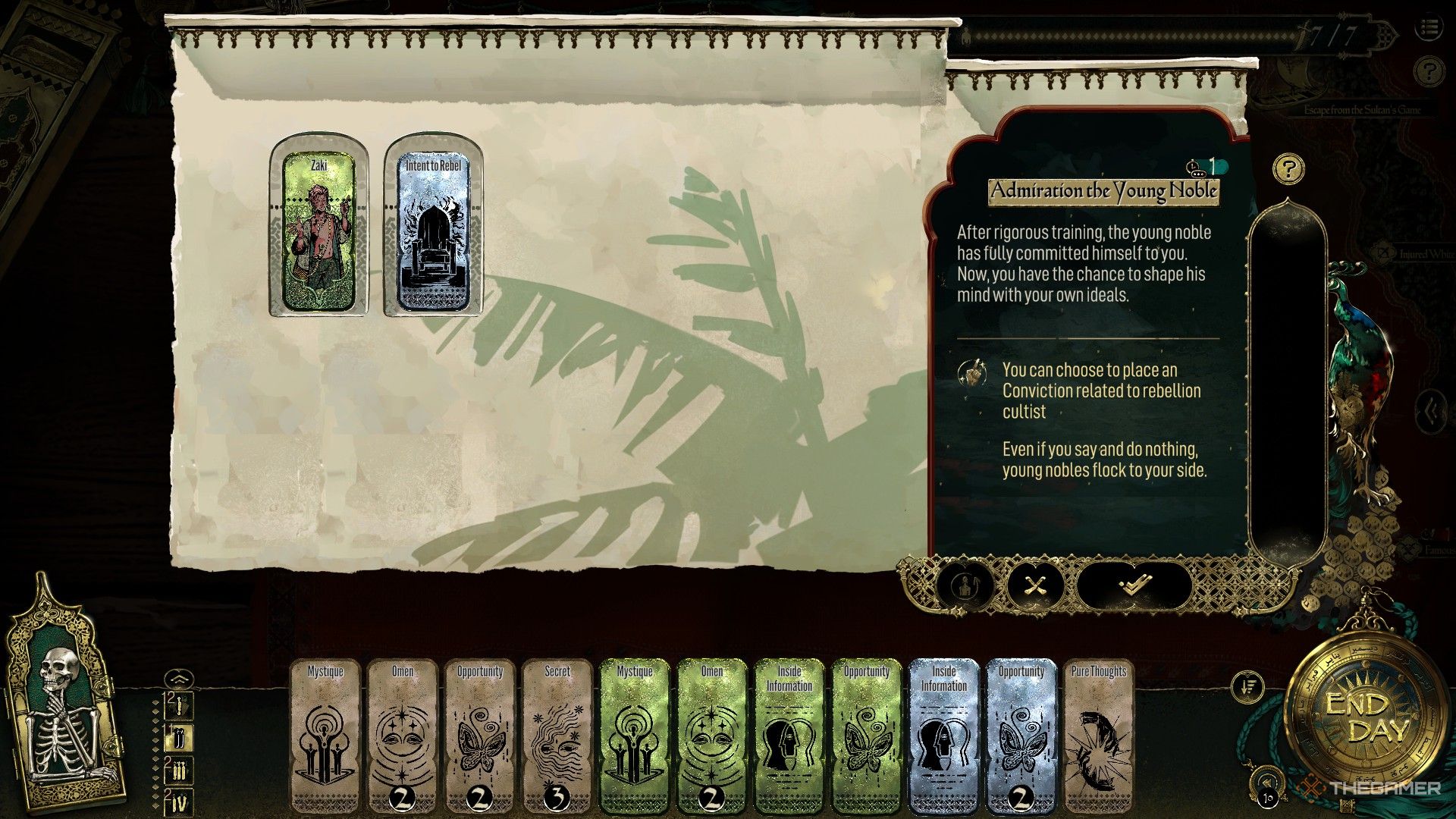
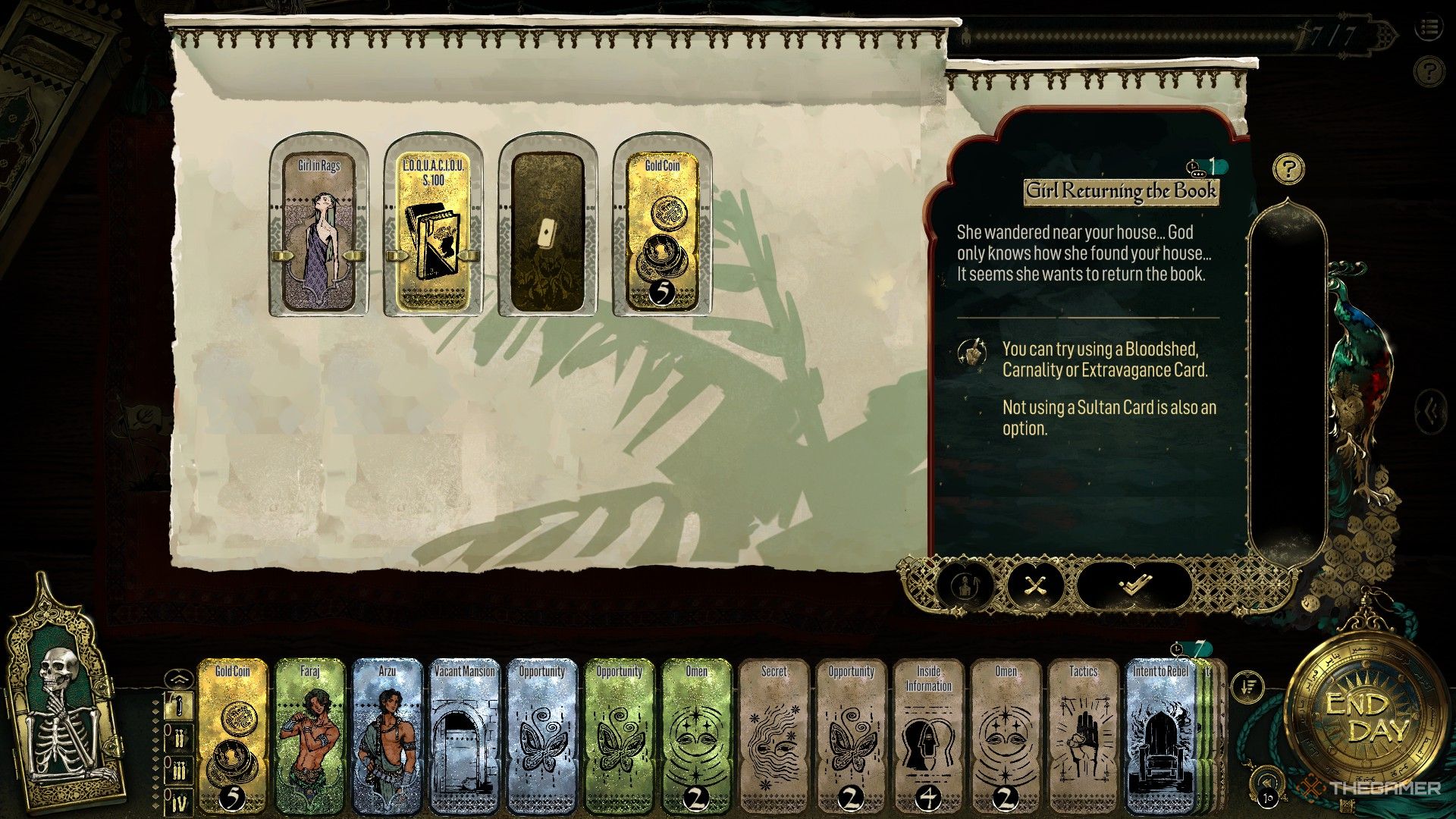
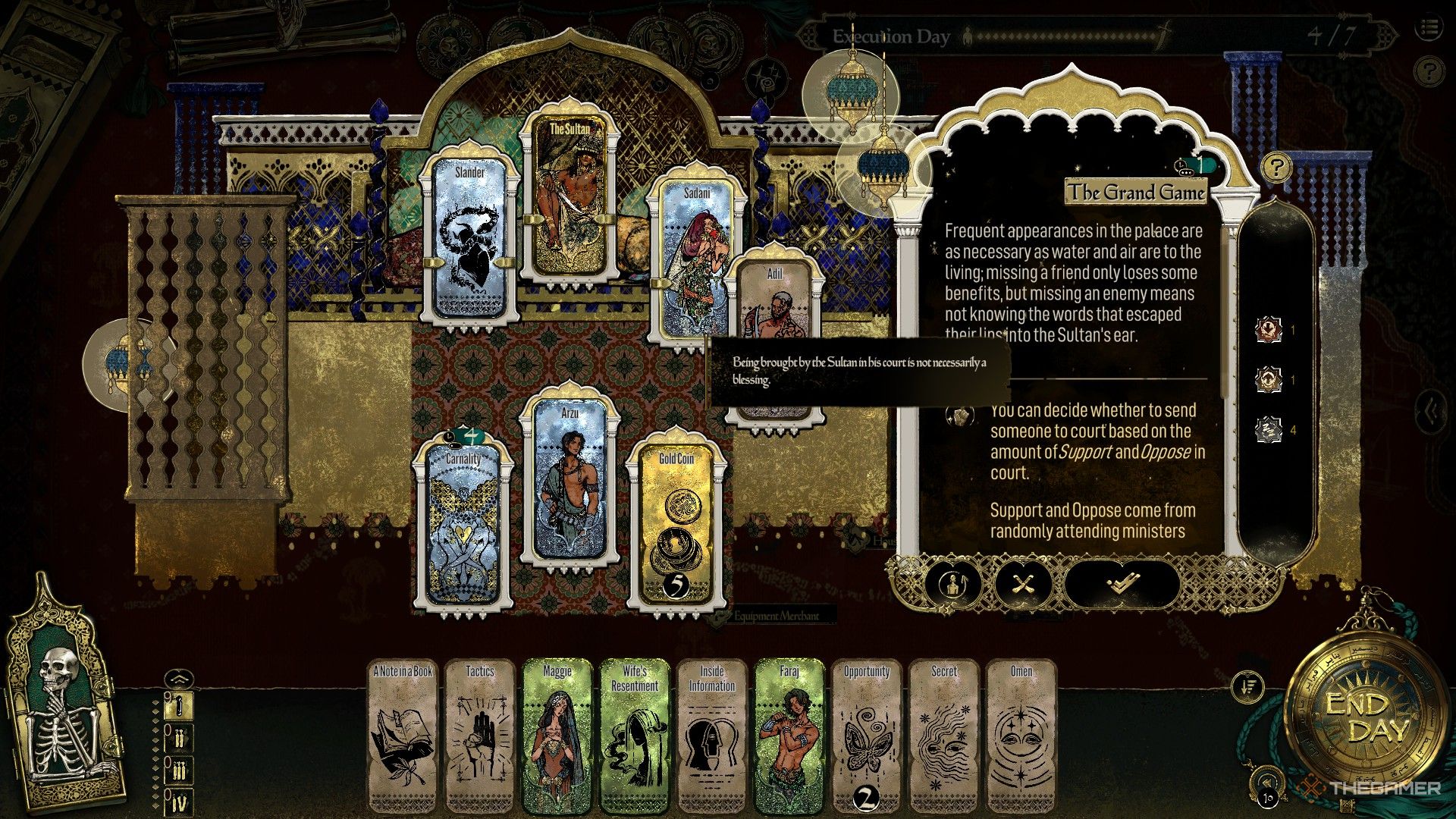
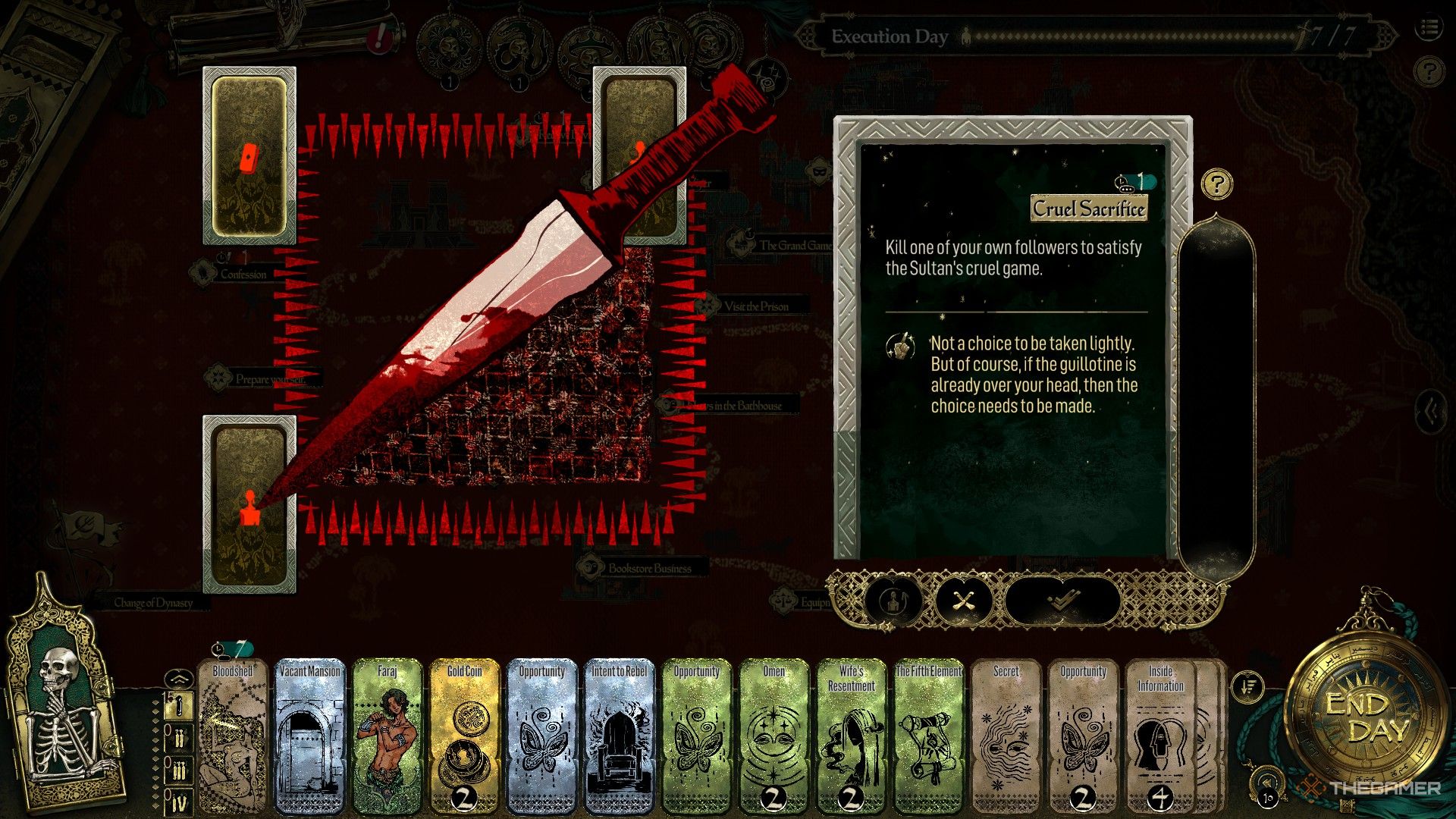
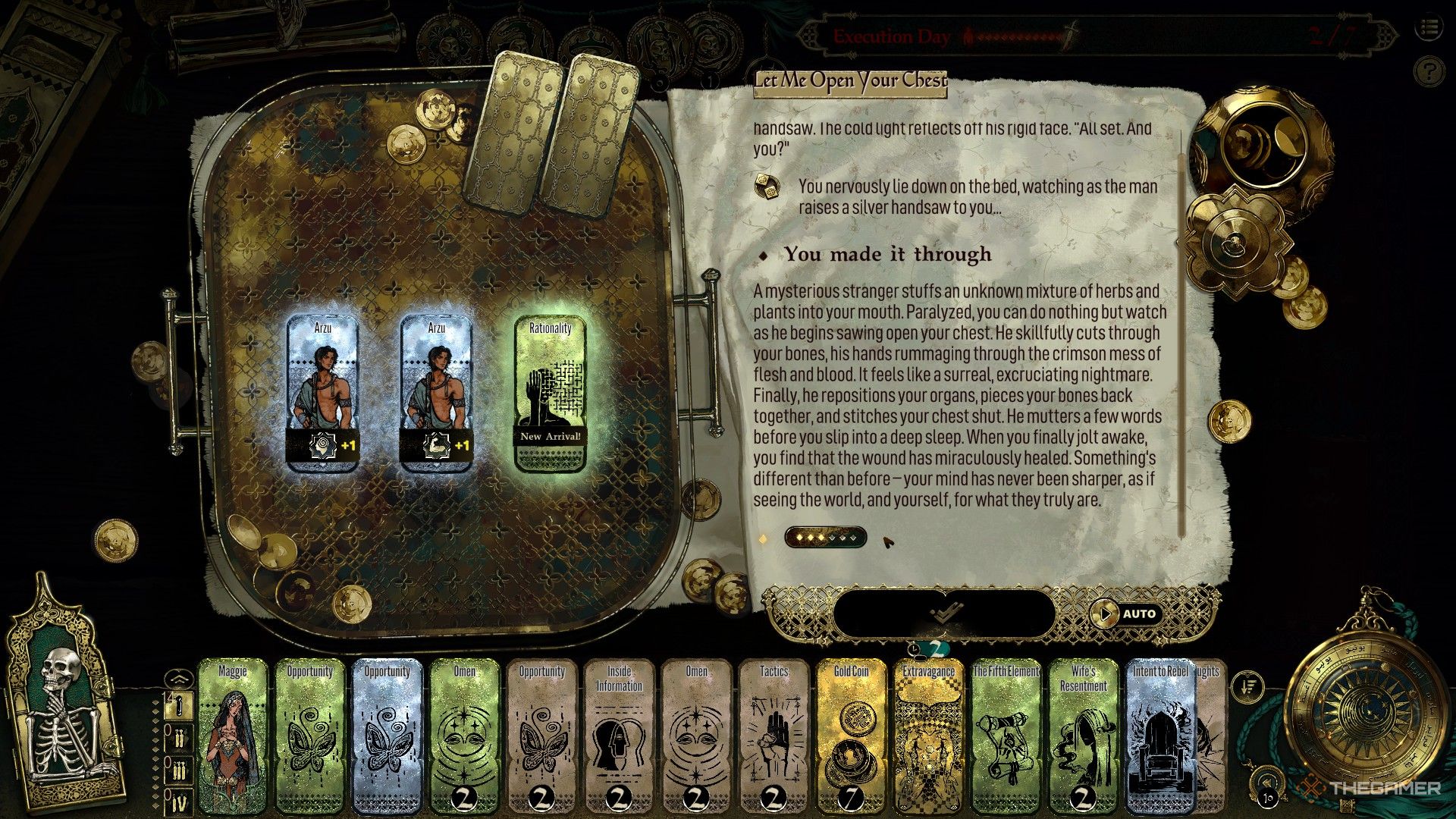
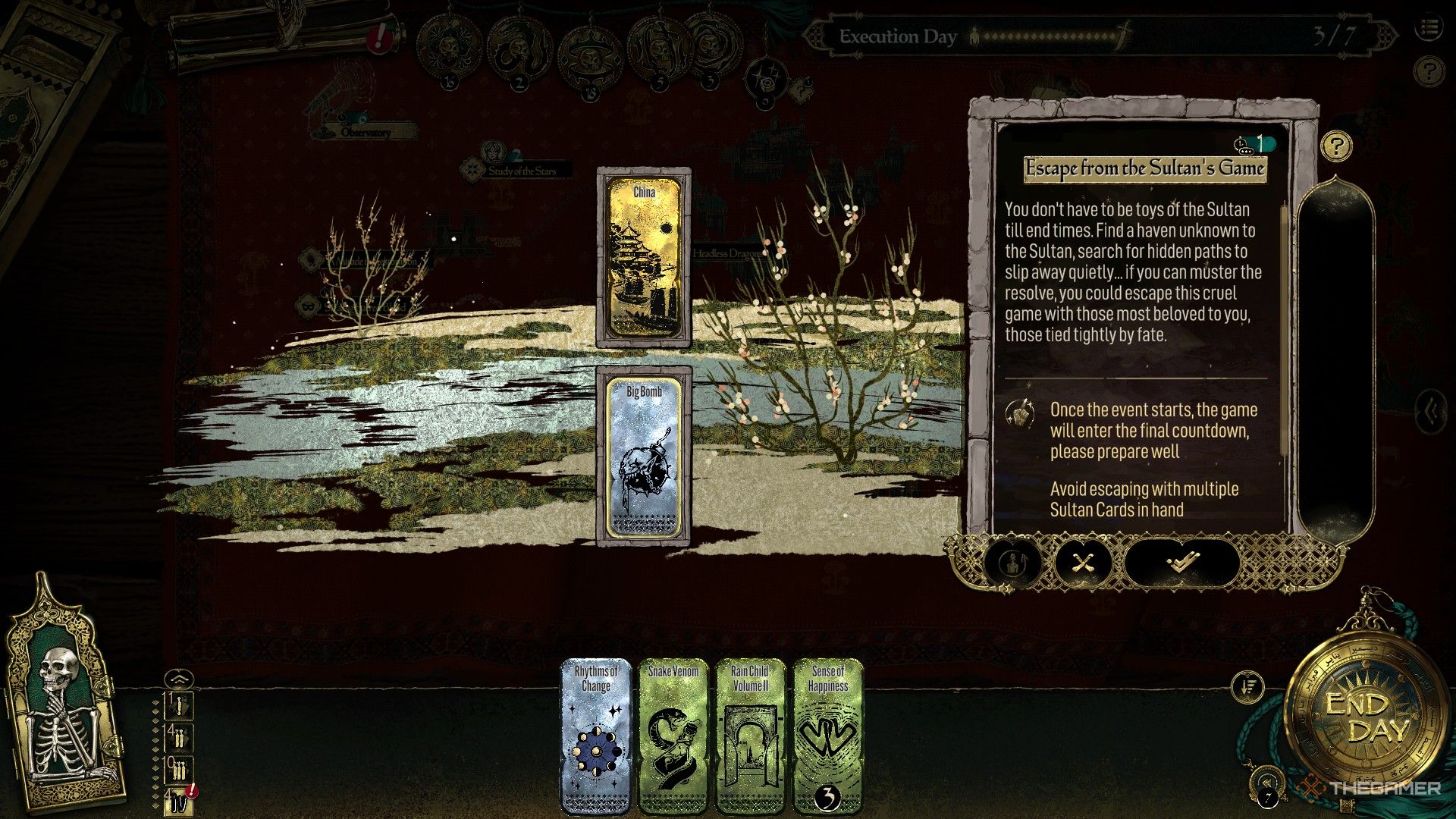
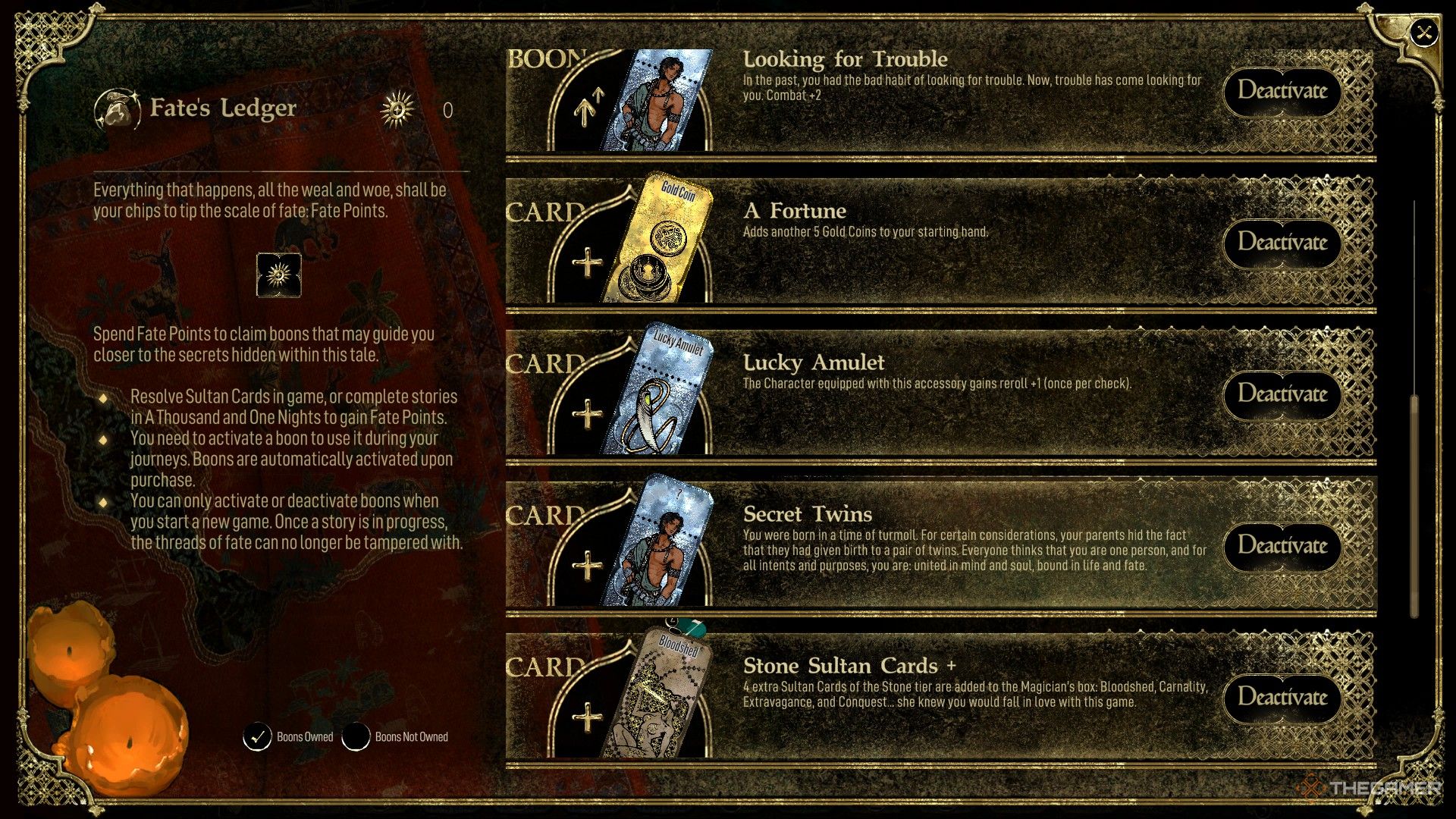

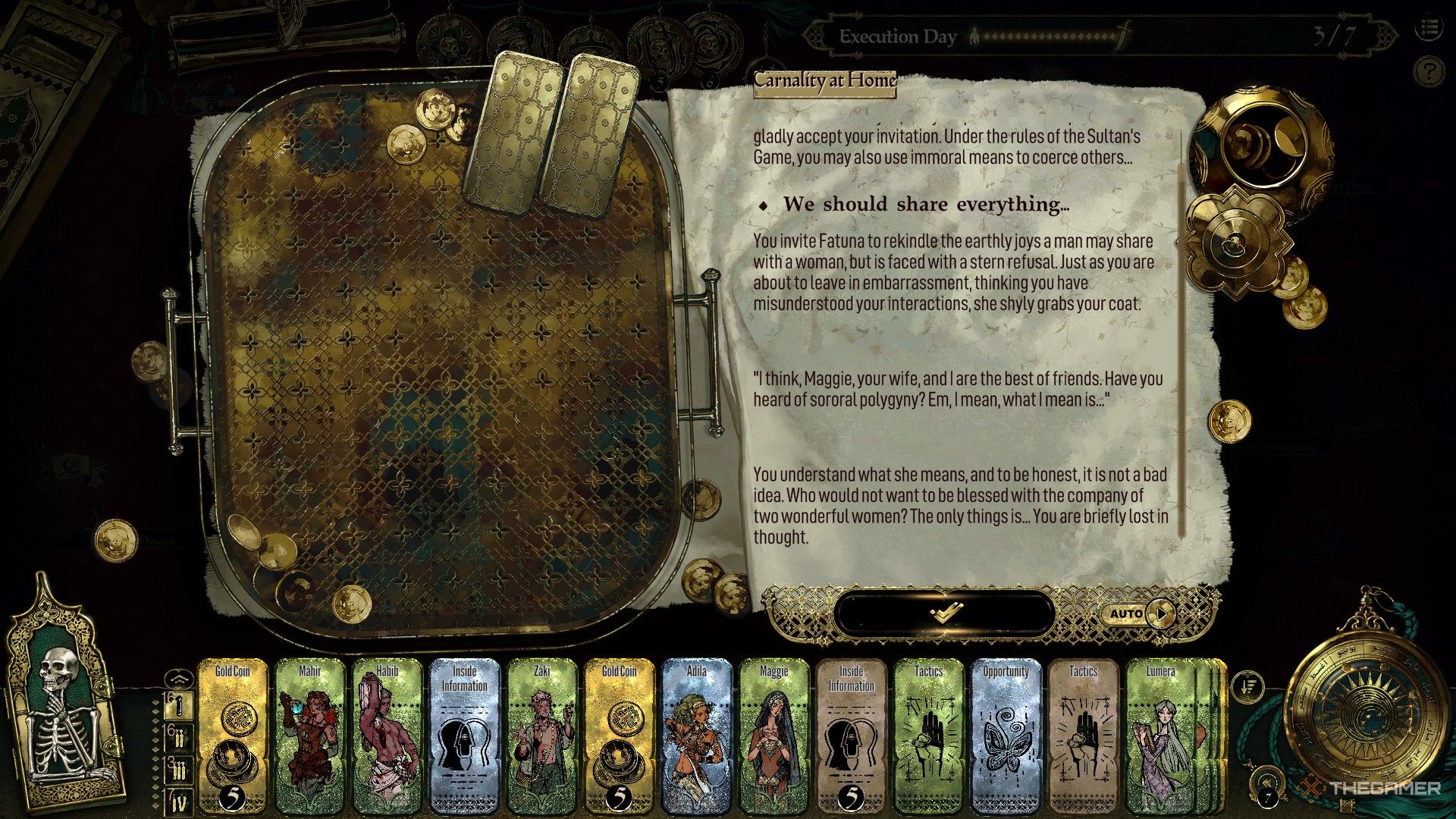


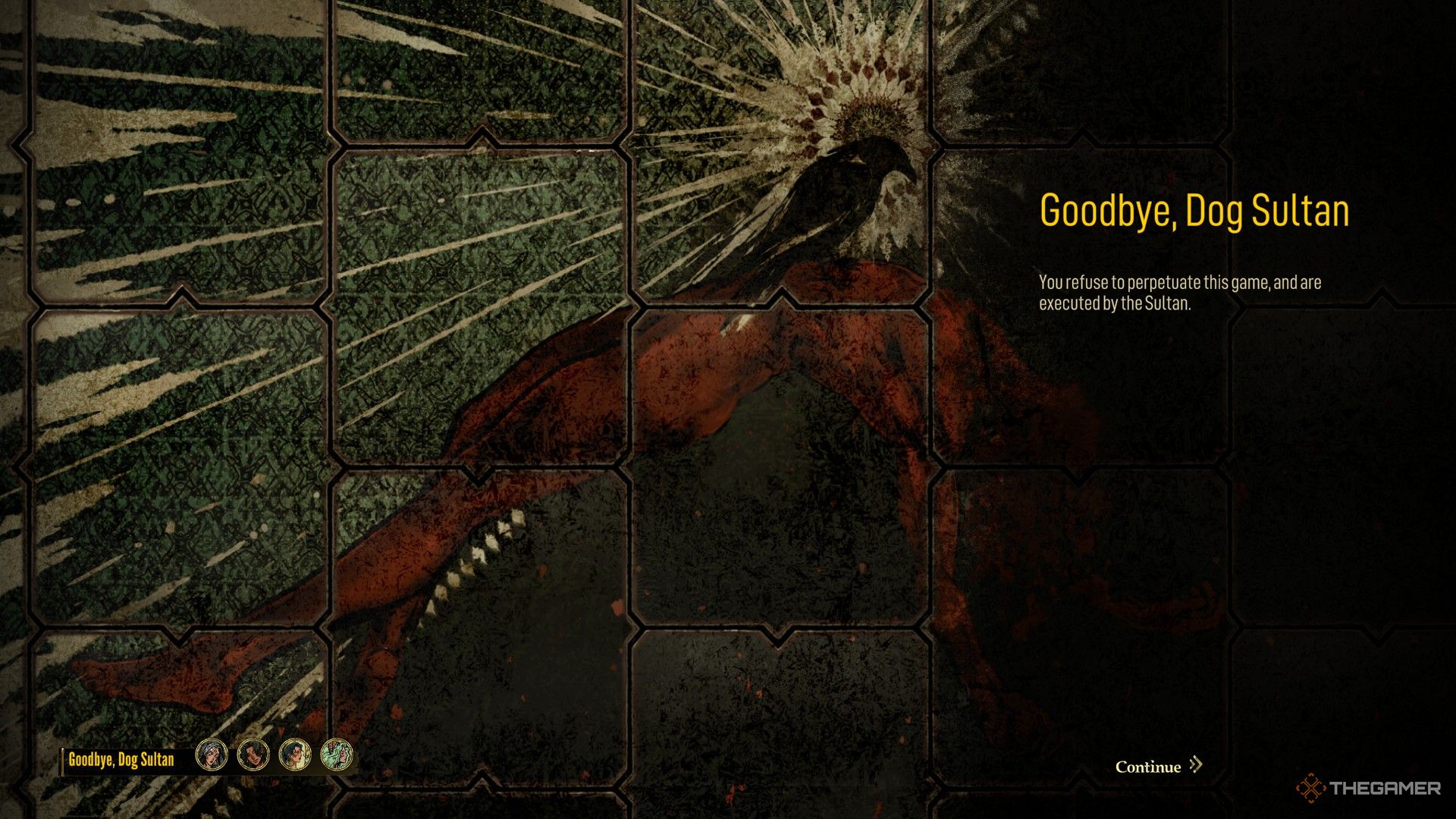
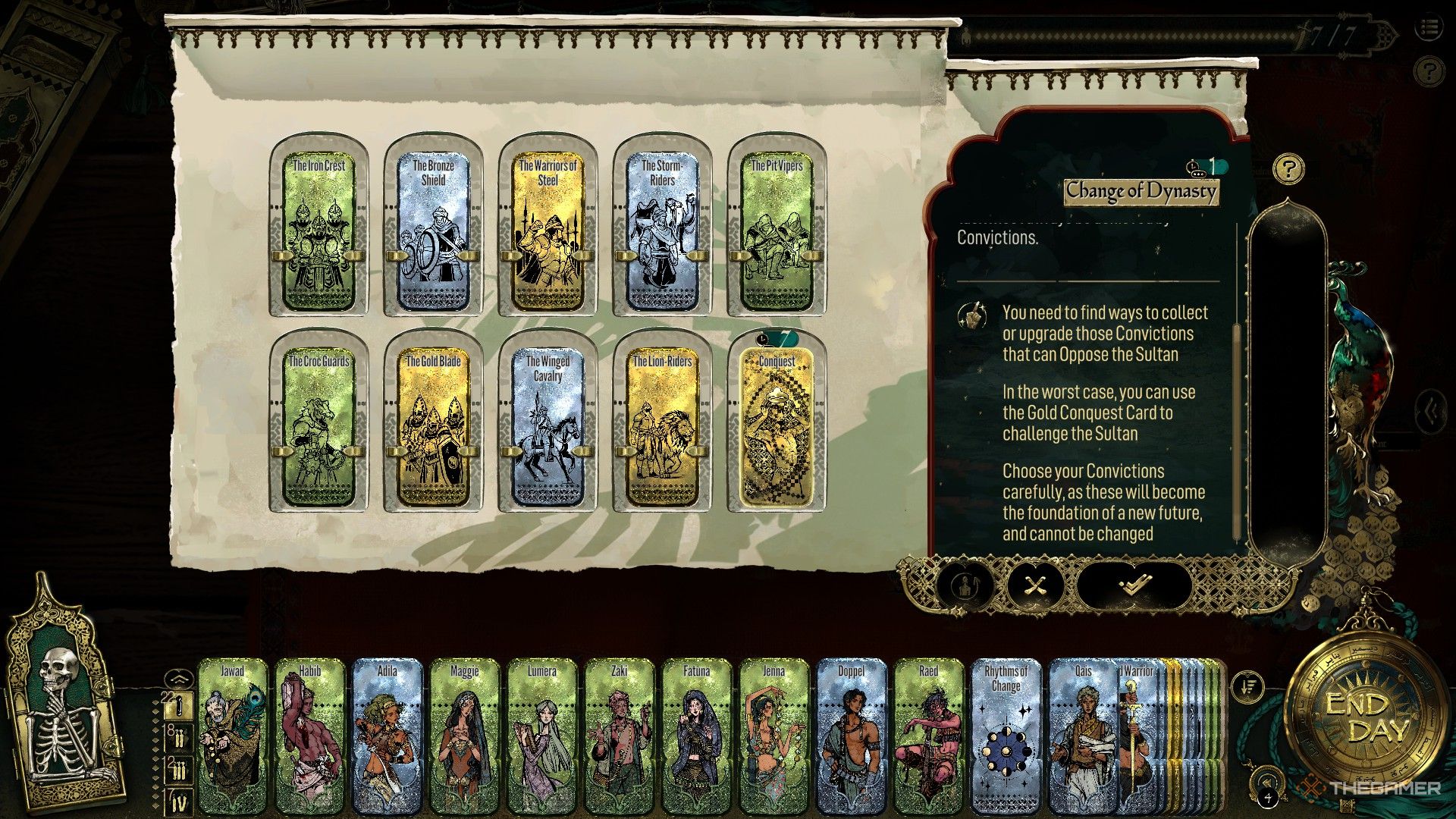









Leave a Reply